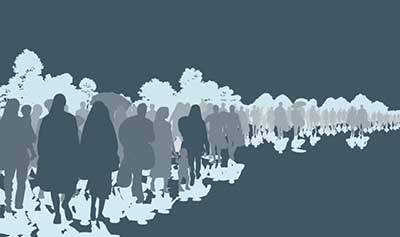Relevance: GS-1: population and associated issues, poverty and developmental issues, urbanization, their problems, and their remedies.
Key Phrases: Welfare access portability, Periodic Labour Force Survey (PLFS) 2020-21, reverse migration, safety nets, certainty effect, Prospect Theory, urban housing, bare necessities portable, One Nation, One Ration Card.
Context:
- The recently released Periodic Labour Force Survey (PLFS) 2020-21 shows that 20.8% of total male migration in the country was from urban to rural areas in 2020-21.
- The 2011 census had found that proportion to be merely 8% back then.
Prospect Theory
- Daniel Kahneman and Amos Tversky’s seminal work on Prospect Theory discussed the ‘certainty effect’, wherein “people underweight outcomes that are merely probable in comparison with outcomes that are obtained with certainty”;
- This tendency, called the certainty effect, contributes to risk aversion in choices involving sure gains and to risk seeking in choices involving sure losses.
- Thus, in the absence of certainty, uncertainty, coupled with information asymmetry, shapes human behaviour.
- Humans are inherently risk-averse, so they try to reduce uncertainties as it triggers negative affective responses.
- Agents try to predict uncertainty based on past knowledge, contextual cues, and available information.
- In case of an unexpected shock, this becomes difficult, and humans tend to become more risk-averse.
- The inherent tendency then is to rely on tried and tested institutions and networks.
- The sudden reverse migration from urban to rural areas during the first phase of the covid pandemic reflects this phenomenon.
Reasons for reverse migration:
- The volume and direction of migration both vary depending on fluctuations in the economy.
- Only 6.7% of male migrants have attributed their migration to the loss of a job, closure of the unit, or lack of employment opportunities.
- Health-related uncertainty, lockdowns, and the temporary closure of units, shops, and establishments, coupled with the absence of a safety net in some instances, may have been the.
Difficulty in determining what a safety net is:
- Government policies create safety nets for those who need them, but when people migrate, they often miss out on the geographically-fixed benefits.
- A pre-requisite for any policy intervention for migrants is to identify who the migrants are.
- In 1979, India enacted its Inter-State Migrant Workmen (Regulation of
Employment and Conditions of Service) Act, which has provisions for the
registration of inter-state migrants. Among other things, this Act
lists the duties and obligations of a contractor.
- The law enjoins this entity “to furnish in respect of every inter-state migrant workman who ceases to be employed, a return to the specified authority in the state from which he is recruited and in the state in which he is employed, which shall include a declaration that all the wages and other dues payable to the workman and the fare for the return journey back to his state have been paid”.
- The job of implementing the Act rests with Indian states and as pointed out by several studies most states do not enforce this statute.
- Some states do have safety net provisions, but there are problems with the dissemination of information—which must be aimed at the appropriate beneficiaries.
Making access to bare necessities portable:
- In a federal system, due to the absence of efforts by states, the Union government has initiated the process of making access to bare necessities portable.
- Benefits:
- In the short term, it helps the Centre create a safety net for individuals, especially migrants, in the absence of the enactment of statutes by states.
- It lets individuals take risks; a safety net enables one to migrate elsewhere for better economic opportunities without worrying about failure.
- It allows individuals to maintain the same social safety benefits across the country.
- Schemes like One Nation, One Ration Card, and Ayushman Bharat have helped ensure that Indians have largely uniform access to food and healthcare.
- However, in both these schemes, errors need to be plugged—especially of exclusion—that is stacked against the poor.
Concern about urban housing for migrants:
- The mushrooming of slums in tier 1 and tier 2 cities is a testament to this.
- Recently, the Union government attempted to address this issue by introducing affordable rental housing complexes, a sub-scheme under the urban Pradhan Mantri Awas Yojana.
- However, for the successful implementation of such schemes, it again becomes necessary to identify migrants.
Conclusion:
- Therefore, states should work with the Centre to reduce uncertainties for migrant workers.
- The central government and states must work together to identify migrants to reduce inclusion and exclusion errors.
- While bare necessities could be a starting point, portability of benefits should not be confined to them.
- Their contours should be widened to such dimensions as access to education. Only then can India ensure the foolproof inclusion of migrants.
Source: Live-Mint
Mains Question:
Q. There is a need to work on a strong safety net along with making access to bare necessities portable to solve the problems of the migrant population. Discuss.








